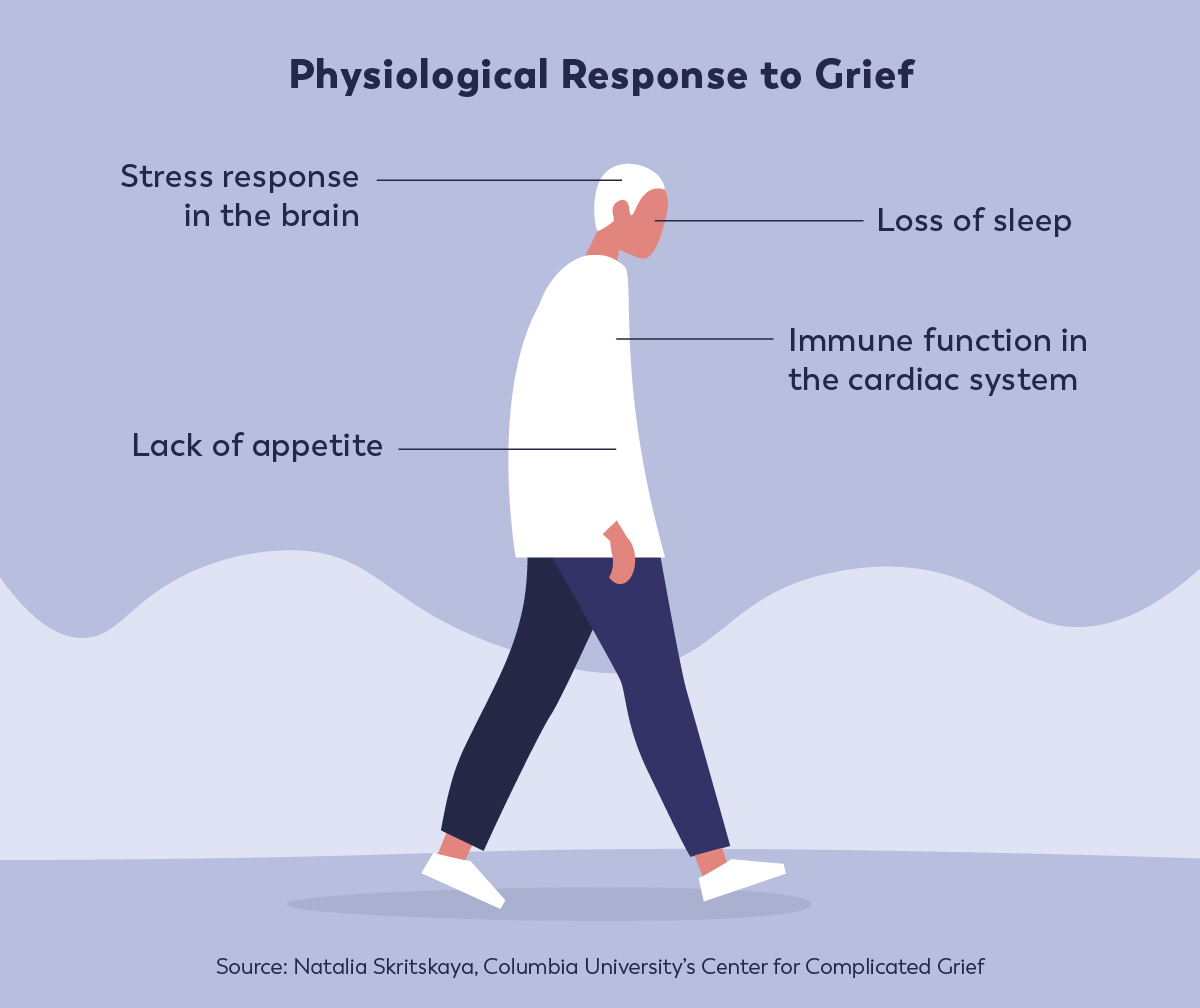How to Identify and Address Complicated Grief

Grief is a subject that can be easy to tiptoe around. It’s the natural response to the loss of someone who was meaningful. But what happens when grief lingers?
When a loved one dies, many people experience grief that eventually subsides as they acclimate back into their life and routine. However, complicated grief, or chronic bereavement disorder, is a clinical term that refers to grief that is ingrained in a person’s habits to a disabling degree, impairing functioning.
Complicated grief can affect more than just emotions; it can take over someone’s life. According to the Mayo Clinic, this form of grief can lead to feelings of worthlessness and even suicide, similar to mental health disorders such as depression. It’s important to recognize the struggle people with complicated grief experience – when starting over again feels like the last thing they want to do.
What Types of Grief Exist?
Grief doesn’t look the same for everyone. Depending on the time frame, grief can come in three stages, according to Columbia University’s Center for Complicated Grief.
ACUTE GRIEF

INTEGRATED GRIEF

COMPLICATED GRIEF

What Are Causes of Complicated Grief?
Complicated grief affects how someone adapts to a loss. According to the Center for Complicated Grief, there are three processes related to loss adaption:
- Accepting reality by recognizing the loss is final and there are consequences.
- Reconfiguring an internalized relationship with the deceased.
- Finding fulfillment and joy in living life and moving forward with purpose.
Dr. Natalia Skritskaya, a psychologist at the Center for Complicated Grief, believes all people have a built-in biological capacity to adapt that helps restore normalcy, re-envision the future, and re-engage with life. But when something gets in the way of this process, the grief freezes and intensity of emotions stay high.
“We’ve been using the six-month benchmark for adaption to loss, but there’s some debate about certain losses being harder to adapt to – such as a loss of a parent or child, a violent loss, or sudden, unexpected loss of a younger person,” Skritskaya said.
According to a report from the Melissa Institute for Violence Prevention, 5% to 20% of people who are grieving experience complicated grief (PDF, 289 KB). The report backed up Skritskaya’s assertion that developing complicated grief depends heavily on circumstances surrounding the death and is difficult to measure because it’s so subjective for each person.
ACCORDING TO THE MELISSA INSTITUTE, THE FACTORS THAT INFLUENCE COMPLICATED GRIEF CAN INCLUDE:
Events
- Natural versus traumatic violent death – suicide, homicide, accident, finding the loved one’s body after a violent death
- Death in a hospital versus home, or not being present when the loved one dies
- “Preventable death” (perceived negligence of treatment where it seems that the death could have been prevented)
- Multiple deaths around the same time
- Witnessing the death
Relationships
- High marital dependency (if spouse has died)
- Close relationship to a dying patient
Personal History
- History of trauma and losses
- Attachment issues
What Are Symptoms of Complicated Grief?
Grieving a loss can be strenuous and debilitating. Many complicated grief symptoms appear like acute grief; the difference is that the symptoms persist after six to 12 months and impair daily functioning, according to the Melissa Institute.
HAVING AT LEAST FIVE OF THE FOLLOWING SYMPTOMS ARE INDICATORS OF COMPLICATED GRIEF:
- Avoidance of reality
- Inability to accept the death
- Avoidance of triggers and loss reminders
- Refusal to seek help
- Rumination over memories and the past
- Heightened emotions such as feeling empty, numb, detached or meaningless; suicidal thinking; impaired social functioning; difficulty trusting others; confusion about your role in life; feeling life is unfulfilling; missed days at work or school; bouts of crying
The Mayo Clinic adds that people who experience complicated grief may have difficulty continuing with normal routines, may experience social isolation, and may have feelings of self-blame.
“It’s very natural to start thinking of alternative scenarios or things you could have done to prevent the death,” said Skritskaya.
How Does the Body Respond to Complicated Grief?
Grief affects more than emotional responses – it’s also linked to physical responses. Physiological dysregulation manifests through various areas of the body due to grief, said Skritskaya. From sleep to appetite, it can impact daily functioning

The body responds physically to grief through stress response in the brain, loss of sleep, lack of appetite, and weakened immune function in the cardiac system.
How to Address Complicated Grief
Many people who grieve feel pressure to recover from a loss.
“I think we have a cultural attitude that no one wants to hear about death or that they might feel awkward around a grieving person, so people don’t know what to say,” said Skritskaya. “But we don’t grieve well alone.”
One place to turn for support is to a counselor.
Interviewing is one way a counselor can assist with a client’s grieving process and take a closer look at complicated grief. The Grief and Mourning Status Interview and Inventory (GAMSII), highlighted in the Melissa Institute’s report, is a guided interview to address the circumstances of the death, the meaning of what’s been lost, coping mechanisms, the grieving person’s response to death, and overall understanding and comprehension of the grieving process. The interview technique offers suggestions for questions covering the five topics.
STEP 1: ASK PERMISSION TO DISCUSS THE DEATH
- “Would this be a good time to talk about [the deceased]?”
- “How would it be for you if we talked about [the deceased]?”
- “Is there at least one person you can talk to about your grief? Who would be a good person to share your grief with?”
- “You can stop at any time you want. Just share what you’re comfortable with.”
STEP 2: ASK ABOUT THE CIRCUMSTANCES OF THE DEATH
- “What do you recall about how you responded at the time of the event?”
- “Put yourself back there now. How did you hear about the death?”
- “How have your feelings changed over time?”
- “What was the most emotionally difficult part of the experience for you?”
STEP 3: ASK ABOUT CURRENT GRIEF EXPERIENCES
- “How has your life changed since [the deceased] died?”
- “How much does your grief still interfere with your life?”
- “What lingers from the loss?”
- “What has it been like for you to go through your daily routine with [the deceased]?”
STEP 4: ASK ABOUT COPING
- “Can we take a moment to discuss what challenges and losses you have experienced in the past? How did you overcome them?”
- “Who was most helpful in helping you cope?”
- “Can you mobilize your own self-healing?”
- “Could you answer the following question: ‘Although I am sad, I am still able to ____.’”
STEP 5: ASK ABOUT THE DECEASED
- “What was your relationship like with [the deceased]?”
- “What did you most appreciate about him/her?”
- “If I was watching you earlier in your life, what moments would I have seen that would help me best understand the connection you two shared?”
- “If [the deceased] were here now, what advice or guidance would he/she offer?”
Counselors may also encourage the use of self-monitoring procedures, such as the Grief Monitoring Diary. Journaling allows people with complicated grief to rate their grief intensity. By using this diary, clients better understand where they’re at with grief. Coping this way can help clients sort out their emotions and map triggers and variability in responses to grief.
What Individuals Can Do to Deal with Prolonged Grief
With the COVID-19 pandemic, unrelenting natural disasters, international conflict and high-profile incidents of violence, many people are collectively grappling with loss and subsequent grief. Some may experience grief more intensely than others do, for longer periods of time.
There are ways to deal with prolonged grief by taking anticipatory steps to address loss. A study on surrogate decision-makers for the critically ill indicates that social workers and counselors can help caregivers mentally prepare for a loved one’s death, which could stave off symptoms of complicated or prolonged grief. Many people who experience loss may not have the chance to anticipate it, but for those who do, Psychology Today and Mental Health America (PDF, 2MB) offer the following suggestions for dealing with grief:
- Express your feelings to your loved one. If they have already passed, write down everything you would want to say to them if they were still here.
- Acknowledge that you will mourn. It may be painful, but denying the mourning process will only delay your ability to move forward. Otherwise, you may feel emotionally stuck for a long time.
- Imagine life without your loved one. It’s important to envision and construct your future as something that’s still positive and fulfilling, even without the deceased.
- Reframe negative thoughts into positive. For example, instead of saying, “No one will love me like they did,” tell yourself, “Other people will love me in different ways.”
- Find ways to honor the loss. You can plant a tree in remembrance of the loved one, hang their pictures in your home, or do some of their favorite activities.
- View your experiences of mourning as your strength. When you see that you’re able to live life without the person you had, it can be self-empowering. It can also equip you with skills to deal with tough situations in the future.
- Remember the good times. It’s easy to fixate on the pain when you are grieving, but it’s important to give gratitude to the memories and life lessons you took away from your time with your loved one.
What Can Loved Ones Do to Help?
Having social support is key to helping with adaptation. Active listening can be a good approach to help a grieving person. Active listening starts with asking how someone who is grieving is feeling and letting them guide the direction of the conversation. It’s important not to interrupt, but rather to be encouraging and responsive with positive feedback and focus closely on what the bereaved person is saying and feeling.
“Don’t push what you think is helpful,” Skritskaya said. “Let them take the lead and be sensitive to what they prefer to talk about.”
Loved ones can help a grieving person plan and organize opportunities for positive emotions to emerge by doing simple things like going on a walk together or reminding them of an activity they used to enjoy.
“People who are struggling with grief feel they have to accommodate other people when it comes to their emotions, so just being there for someone makes a big difference,” she said.
One thing to remember is that people may want to talk about their deceased loved ones but fear they will make others uncomfortable by sharing old memories. Loved ones should give them the space to voice their thoughts and feelings in an honest way.
“Loss adaptation is like relearning life again,” said Skritskaya. “You have to give it time.”
If you’re interested in pursuing a career in counseling, read more about how to become a grief counselor and visit our list of master’s in mental health counseling programs online to find the right school for you.

